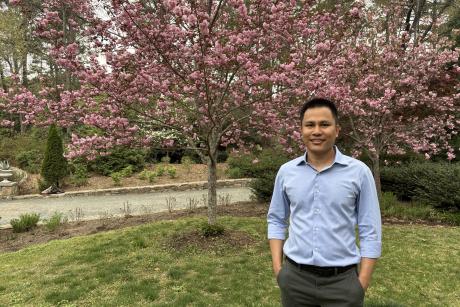The blog post below was originally submitted to the course blog for Global Health Challenges, a first-year core course in the Master of Science in Global Health program. It is re-posted here as a way to feature the interdisciplinary context of our program and conversations prominent among our students.
By Hillary Richards
MSc-GH Candidate
“Health is a human right.”
We’ve all probably heard or uttered this statement. Some of us may refer to it as a major reason for pursuing careers in healthcare. Coming from an academic background in which many colleagues have pursued careers in human rights activism, particularly political and civic activism, I was very idealistic in pursuing global health with the belief that health as a human right cannot be contested or strongly politicized. How can health, be it access to care or any other issue, not be considered a basic human right? How can there be any dispute as to what is and is not covered or defined as “health” in the context of human rights?
Dr. Bob Cook-Deegan’s lecture on health & human rights truly showed the complexities of health as a human right through history, legislation and current events. His lecture covered the positive work done concerning health rights along with the bad or murky aspects of the field as well.
The Good
There has been a large amount of development in the field of health as a human right, from legislation to on-the-ground research and reporting. The founding of human rights organizations in the 1960s and 70s, including Amnesty International and Human Rights Watch, while mainly focusing on sub-topics of human rights such as political and civil rights, have grown to encompass advocacy of health as a human right as well. While Amnesty International started off using a “shaming strategy” to publicize political imprisonment, expansion over time included documentation of torture or human rights abuses concerning health issues. The inclusion of health care professionals to help gather evidence of human rights violations is an extremely important and vital component of many areas of activism today; as Dr. Cook-Deegan stated, the notion that health is a core component to economic growth and stability of democracy or governments, that there much be investment in health in order to get anything else from society (economically, politically, etc.) has been promoted and accepted over the years.
Dr. Cook-Deegan also discussed the coining of the definition of “genocide” as a crime against humanity by Raphael Lemkin during his time at Duke University. As a lawyer, he actively and successfully worked to have the crime of genocide included in international law in 1948. It was a major achievement, particularly because it was turned into actual legislation rather than serving as an aspirational document without legal implementation.
The Bad
While health care workers documenting health abuses and violations has been productive, there have been many challenges and barriers for them to fulfill their work. There have been many cases in which access to locations or facilities to gather information has been blocked; this may be due to conflict, local/state government refusal, or other reasons. Health care workers looking into health abuses/violations, like all other activists, are sometimes targeted for the work they intend to do; many countries, at the government or local population level, may oppose unearthing these abuses within their countries, unwilling to have their land or people associated with such crimes and violations.
Concerning legislation, such as defining genocide as a crime against humanity, there is also a downside. Legislation concerning health/healthcare as a human right is subject to the same processes, wording, implementation and other components as any other form of legislation: it takes quite a lot of time to pass legislation, wording is broad/vague and implementation varies from situation to situation or country to country. We have language that defines genocide, and we have a law that it is a crime against humanity, but how often is it implemented? There are many contestations to whether an event was an act of genocide or not, even when it clearly falls under the category.
The Ugly (or “Murky”)
There have been many strides in advocating for health as a human right. The acknowledgement of health as a basic human right and the integration of research into and documentation/evidence of health abuses into human rights work and advocacy more broadly have been truly important and essential for human rights organizations. There have, however, been many problems with documenting human rights abuses regarding health and the drawing up or implementation of legislation regarding health and human rights. Some questions that are still unresolved are: If health is a human right, who is responsible for making certain that this human right is being upheld? What is to be done about the fact that there is no universal documentation of health abuses? What should be done about those who bar access to health care workers seeking to document abuses? Hopefully, over time, we will be able to thoroughly tackle some of these issues, allowing health care workers to safely and effectively carry out their investigations and leading to more thoroughly-defined legislation concerning health and human rights.



